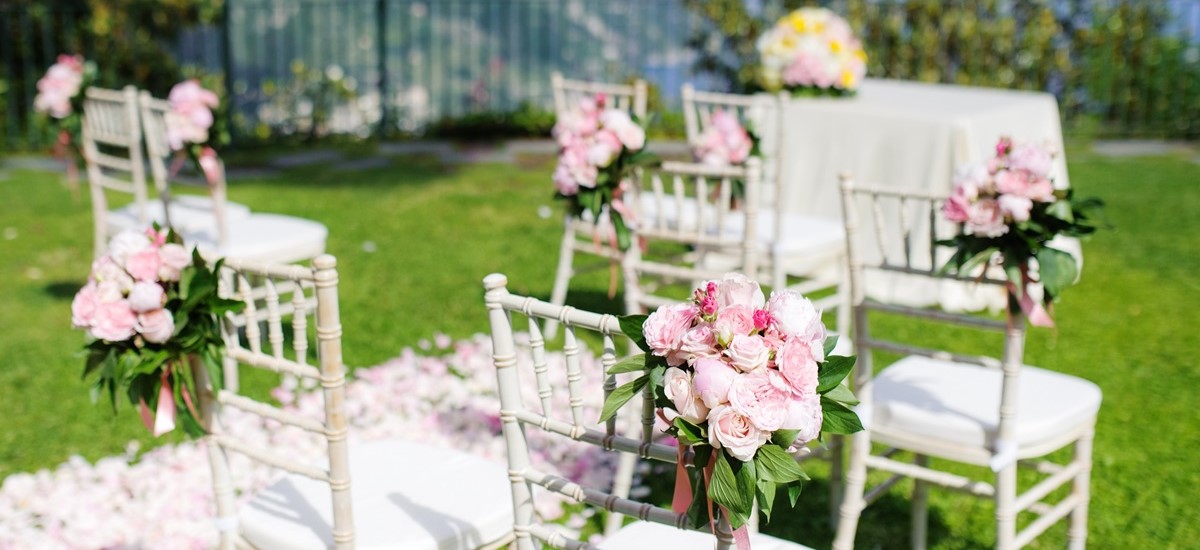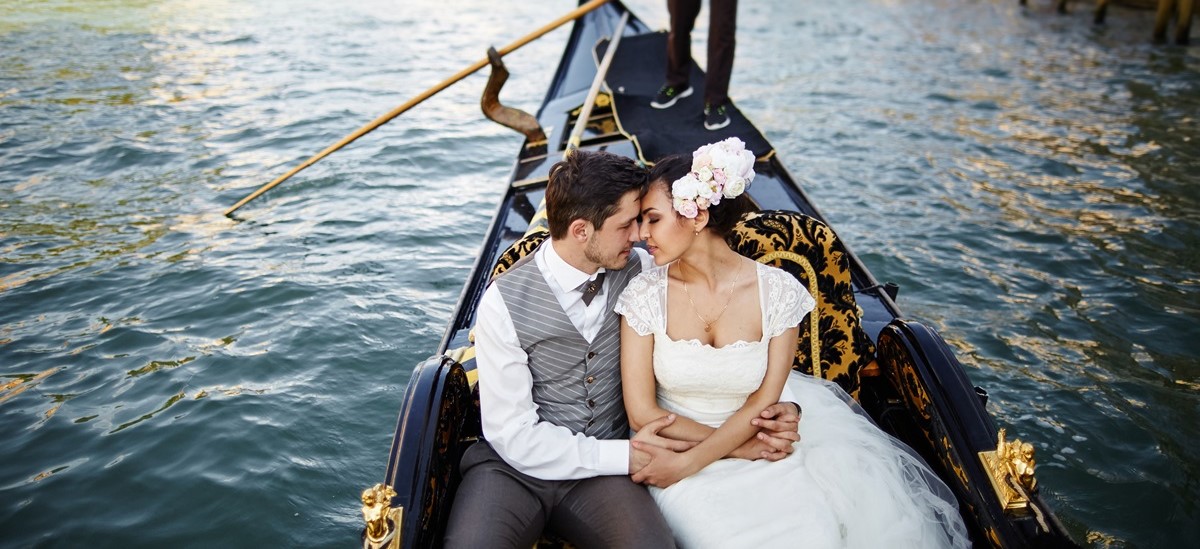Residence permit in Italy: Guide for UK citizens
Read our guide explaining the resident permit in Italy, including different types of permits, how to apply and how much it costs.

Italy holds a special place in the hearts of many couples, whether they met there or have been on a romantic Italian trip. As with any wedding, getting married in Italy requires careful planning. The key difference is that you’ll also need a basic understanding of Italian law and must meet certain administrative deadlines.
In this guide, we’ll walk you through everything you need to know about getting married in Italy. We’ll cover legal requirements, mandatory documentation, estimated costs and suggested locales.
We will also share a handy way to manage your wedding expenses abroad. The Wise card can be used in 160+ countries, including Italy, letting you send and spend at the mid-market exchange rate.

Italy is a very popular wedding destination, but it might not be the right fit for everyone. In a country where celebrations are taken seriously, weddings reflect that same spirit. Italian weddings are known for being colorful, vibrant and fun affairs, from the food to the atmosphere to the lively music.
Anyone can be married in Italy regardless of nationality, as there's no legal residency requirement for a wedding.
Whether you’re marrying an Italian citizen or a foreigner, you’ll have to provide paperwork that certifies your identity.
You also must certify that there are no legal obstacles standing in the way of your marriage.1
In Italy, you can have a civil, religious or symbolic wedding ceremony. Of the three, a symbolic ceremony is the only one that isn’t legally binding, making it a way to have a destination wedding without the legal formalities.2
Civil wedding ceremonies are performed in places approved by the Italian government. Although they’re generally held at city halls, there are also other venues you could choose from, such as villas and outdoor settings.
A civil ceremony in Italy is rather standard, but you can personalise it with music, vows and readings.2
When it comes to religious weddings, Italy recognises ceremonies from all faiths, including Catholic, Jewish, Hindu and Muslim religions.
For non-Catholic religious weddings, a civil ceremony must be incorporated into the marriage before a wedding is officially legal. You’ll be required to prove you're civilly married before you can celebrate in a religious house of worship.3

Italy recognises same-sex civil unions and partnerships, but not same-sex marriage.
This means that same-sex couples can’t enjoy all privileges in Italy, such as adoption or IVF, but they can still hold a wedding ceremony.4
You may want to embrace one or more of the following Italian traditions on your big day:
In order to legally get married in Italy, both you and your partner must be of legal age or have parental consent if you’re minors.8
You also need to be single, divorced or widowed. You’ll have to prove these things by providing a divorce decree or the death certificate of your former spouse.5
All the legal requirements that apply to Italian citizens also apply to foreigners.8 The main difference is that foreigners must have all required documents officially translated into Italian.5
Here are the documents you should provide as a foreigner getting married in Italy:
A Catholic wedding may also require some of the following documentation:
Since there are no residency requirements for those getting married in Italy from the UK, you can arrive just a few days in advance to take care of the paperwork.
Alternatively, you can complete it a few months before the wedding to avoid any last-minute stress. This may be a good time to visit your venue in person or arrange any wedding plans before the big day.
You can find the UK Embassy in Rome at Via Venti Settembre 80/a, but the Consular Section is available by appointment only. You can contact them through an online inquiry or by phone in case of an emergency.7

Let’s go through some of the most important steps of getting married in Italy, we’ll go through some of them in more detail later on:
Knowing how to prepare starts with deciding whether you’ll have a civil or religious ceremony. This will help with budgeting and timing, since religious weddings often require additional documents.
This is one of the most important steps and it might require multiple trips to Italy. Hiring a wedding planner can be of great help. Once the venue is secured, you can plan other details with them.
Make sure your passport is valid and that you know where your birth certificate is. You’ll also need to book an appointment at a UK register office for a Certificate of No Impediment, which is the equivalent of Nulla Osta in Italy. The CNI is valid for 6 months.8
The next step is getting the CNI and other documents translated and legalised, as well as signing a bilingual statutory declaration in front of a UK notary public. Alternatively, you can apply for your CNI with the British Embassy in Rome.8
Since the full list of documents can depend on the situation, it’s better to check beforehand, so you don’t miss possible changes.
Take care of transport and your accommodation while in Italy. You can do this as soon as you set the date, so that you can save more money. Save on currency conversion when sending money to Italy by using a Wise account to convert at the mid-market rate for low fees*.
If your partner is Italian, you’ll need to post the banns of marriage on the consular register. You can do this in person or by appointing a third party.1
Here’s a summary of what you need to do to get married in Italy:

The venue is one of the most important elements of your wedding, especially if you’re planning an outdoor celebration.
Make sure you take into account everything from the weather and venue size to accessibility and cost.
With so many options available, you’re likely to find a place that suits your vision.
The best time of year for a wedding in Italy depends on the type of ceremony you want.
Since summers in Italy can get quite hot, a wedding in late spring or early autumn might be a better choice for an outdoor celebration.
If you’re planning an indoor ceremony and want to cut costs, winter is typically a quieter season, though the weather can get cold depending on the region.
On the other hand, a July or August wedding comes with long daylight hours and plenty of sunshine, though the heat can sometimes get intense.
Italy offers an incredible variety of places to get married, including romantic lakes, stunning coastlines and the picturesque countryside.
Some popular destinations are Lake Como and Lake Garda, the vineyards of Tuscany and cities like Rome or Venice.
If you’d like to exchange vows overlooking the sea, consider the Amalfi Coast, Capri or Sicily, to name just a few.
Italy likely has the perfect venue for your nuptials, whether you’d like to hold an intimate celebration or a lavish celebration.
If you’re planning a large wedding, some of the most popular venues include Villa Il Balbiano, Villa Sola Cabiati and Villa Pizzo on the shore of Lake Como. All three feature expansive gardens and impressive artwork, making them a great choice for your special day.9

When it comes to city weddings, some of the most popular luxury venues are the Belmond Hotel Cipriani in Venice and the Villa Aurelia in Rome. Overlooking the St. Mark’s Square and the Eternal City, they guarantee a wedding to remember.9
You should expect to pay the following fees for your Italian wedding:
You may also face some local administrative fees, or charges specific to your parish. Inquire directly with the venue where you'll marry in advance.
Wedding costs in Italy can range from relatively affordable to quite luxurious. Here’s a cost breakdown of what you can expect in some of the most popular destinations, although it can vary depending on your preferences.
| Category | Approximate cost10 |
|---|---|
| 🏰 Venue | €6,000 - €20,000 |
| 🍴 Catering | €100 - €250 per person |
| 📝 Wedding planner | €2,500 - €10,000 |
| 🥂 Open bar | €2,000 - €4,000 |
| 📷 Photography | €2,000 - €12,000 |
| 💐 Decorations | €1,500 - €20,000 |
| 🎶 Music | €1,000 - €7,000 |
In addition to your main expenses, there are other costs to consider when getting married in Italy.
You’ll need to pay for travel from the UK for you and possibly some guests, as well as transportation within Italy.
Hair and makeup services can also add up quickly, especially if you don’t book in advance.
Visiting the venue ahead of your wedding and arriving a few days early is definitely a good idea. Seeing everything in person gives you a chance to sort out any details and feel more prepared.
A wedding planner can not only help you find and book a venue, but also guide you through the timeline of everything that needs to be done for a wedding overseas. While it can be a significant expense, having a local expert advise you is often worth it.
If you, your partner or your guests aren’t fluent in Italian, you should consider hiring an interpreter for the wedding ceremony. Not only is it important that you understand what’s being said, it can also help everyone feel included.
📚 Cost of getting married abroad
A handy way to cover your wedding-related expenses is opening a Wise account. It can help you handle travel costs before the wedding, hire a wedding planner or interpreter, or even the officiator, all while still in the UK.
A Wise account makes it easy to manage your money across borders, allowing you to send large amounts and convert money with low fees*. You can send money to 140+ countries, including Italy, and hold 40+ currencies in your account.
Getting married in Italy is an unforgettable experience, but it can also come with a significant cost. Depending on your preferences, the venue alone can range from €6,000 to €20,000 for the venue and a wedding planner might cost up to €10,000.
Paying for your dream wedding with your Wise account can help you save on currency conversion. Since most of your expenses for your Italian wedding will be in euros, using Wise gives you access to the mid-market exchange rate with low, transparent fees*, helping you avoid extra mark-ups and make your wedding budget go further so you can even afford that dream honeymoon in Mauritius.
Large transfers are also more convenient with Wise, thanks to Wise’s dedicated support team. If you send £20,000 or more, you’ll receive a discount and save on transfers for the rest of the month. Request a call back below or email the team before you plan your big day in Italy.
Sources used in this article:
1. Italian Ministry of Foreign Affairs and International Cooperation - legal requirements for marriage in Italy
2. Exclusive Italy Weddings - Italian wedding ceremonies
3. Italy Wedding Planner - religious weddings in Italy
4. Just Get Married in Italy - same-sex weddings
5. The Wedding Travel Company - legal requirements
6. Tuscany Now and More - weddings in Italy
7. Gov.uk - British Embassy in Rome
8. Gov.uk - CNI and legal requirements
9. Exclusive Italy Weddings - venues
10. Weddings Abroad Guide - cost
Sources last checked on date: 14-Jul-2025
*Please see terms of use and product availability for your region or visit Wise fees and pricing for the most up to date pricing and fee information.
This publication is provided for general information purposes and does not constitute legal, tax or other professional advice from Wise Payments Limited or its subsidiaries and its affiliates, and it is not intended as a substitute for obtaining advice from a financial advisor or any other professional.
We make no representations, warranties or guarantees, whether expressed or implied, that the content in the publication is accurate, complete or up to date.

Read our guide explaining the resident permit in Italy, including different types of permits, how to apply and how much it costs.

Everything UK investors need to know about the Italy Golden Visa, including requirements, costs, benefits, risks, application process and more.

Read our comprehensive guide to getting a mortgage in Italy from the UK, covering everything you need to know.

Read our complete guide to selling your property in Italy, including info on the process, fees, taxes, legal requirements and more.

Getting married or settling down in Italy? Here, we look at how to register marriage in Italy, including documents required and legal processes.

Read our helpful guide on how to transfer a UK pension to Italy, including the steps, fees and taxes involved.